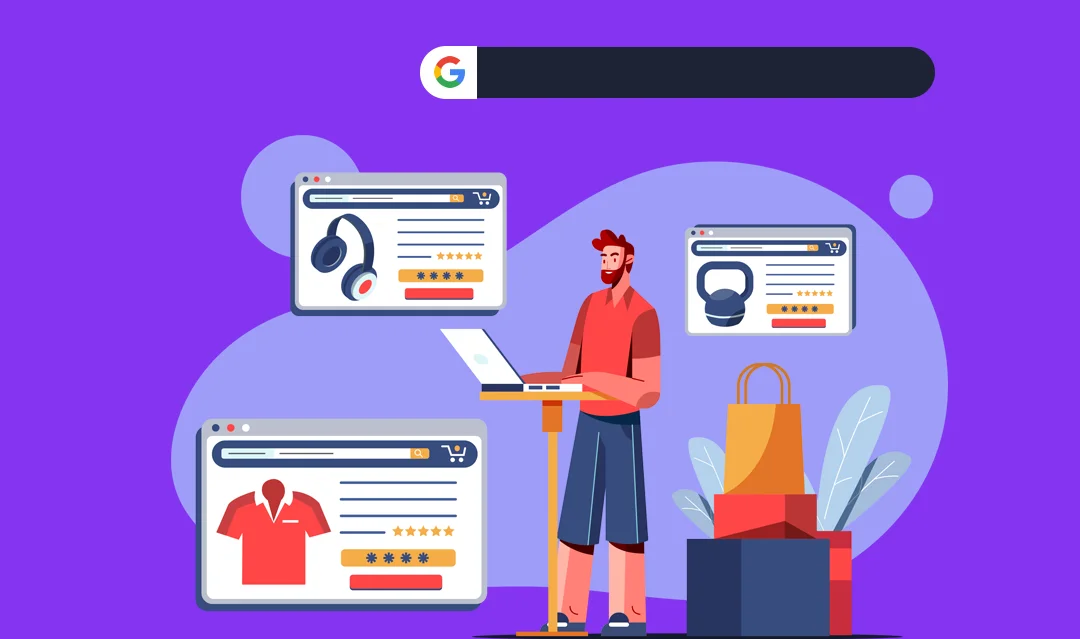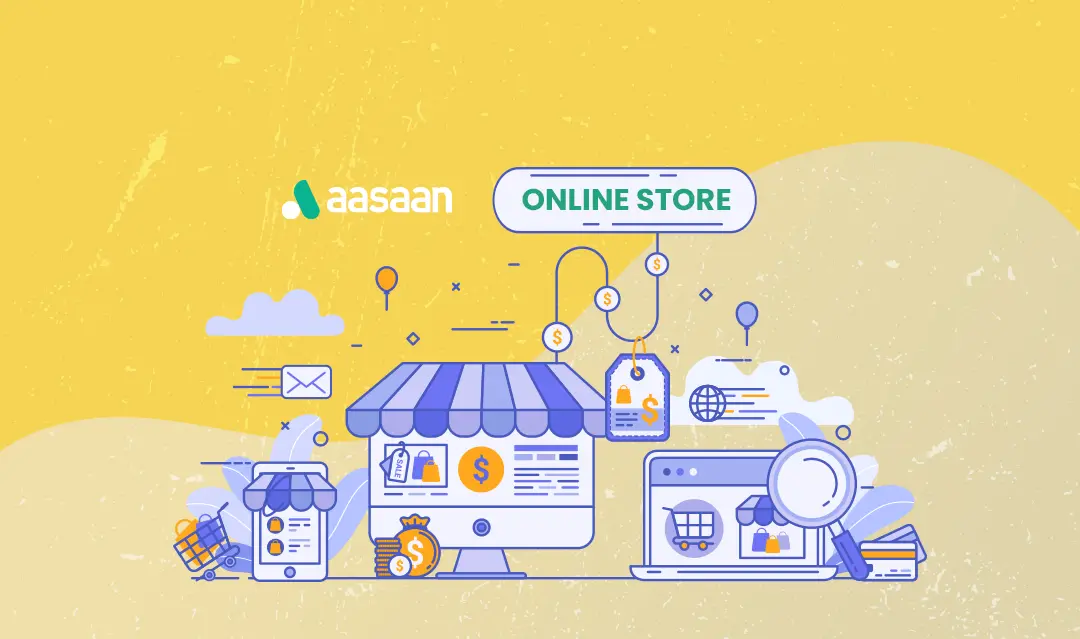
5 Best Headless Commerce Platforms In Singapore
Are you looking for the best headless commerce platforms in Singapore to power your online business? Look no further!
In this article, we’ll unveil the top five platforms that are revolutionizing the way businesses operate in the digital space.
But what exactly makes these platforms stand out from the rest?
Why focus on Singapore, you may ask?
Well, Singapore is a leading hub for digital innovation and eCommerce in Asia.
With its robust digital infrastructure and a thriving online retail industry, it’s the perfect place to explore the potential of headless commerce platforms.
- Revenue in the eCommerce market is projected to reach US$6.59bn in 2023.
- Revenue is expected to show an annual growth rate (CAGR 2023-2027) of 12.20%, resulting in a projected market volume of US$10.45bn by 2027.
Let’s dive in and discover the cutting-edge features and benefits that make them the go-to choices for businesses seeking seamless and flexible commerce solutions.
Understanding Headless Commerce

At its core, headless commerce is about decoupling the front-end and back-end of an eCommerce platform.
This separation allows businesses to manage their eCommerce operations (the back-end) independently from how they present and sell their products to customers (the front-end). This architecture offers several benefits.
Firstly, it allows businesses to create tailored customer experiences. With a headless commerce platform, businesses can build unique, engaging digital experiences that resonate with their customers.
This is a key factor in today’s eCommerce landscape, where customer experience optimization is a top priority.
Secondly, headless commerce platforms offer increased agility and flexibility.
The decoupled nature of these platforms means businesses can quickly adapt to changes in the market or customer behavior. This agility is a significant advantage in the fast-paced world of eCommerce.
Lastly, headless commerce can save businesses time and money. Traditional commerce platforms can be costly and time-consuming to modify.
In contrast, changes to a headless platform can be made quickly and often in-house, leading to cost savings and faster time-to-market.
Why 2025 is the Year of Headless Storefronts?
The year 2025 marks a significant shift in the eCommerce industry, with more businesses moving towards headless commerce platforms.
This trend is driven by the changing needs of businesses and the increasing demand for personalized, engaging digital experiences.
As businesses strive to stay competitive, the ability to quickly adapt to changes and innovate is crucial.
Headless commerce platforms offer the agility businesses need to keep up with the fast-paced eCommerce industry.
Moreover, these platforms allow businesses to leverage new technologies and channels, further driving their growth.
The Criteria for Choosing a Headless commerce solutions
Choosing a headless storefront builder is a critical decision that can significantly impact a business’s success. Here are some factors to consider:
- Flexibility: The platform should offer the flexibility to create unique, engaging customer experiences across various channels.
- Ease of use: The platform should be user-friendly, allowing businesses to make changes quickly and efficiently.
- Integration capabilities: The platform should easily integrate with other systems and tools, such as inventory management systems and marketing tools.
- Support: The platform should offer robust support to help businesses navigate any challenges they may encounter.
- Cost: The platform should offer a cost-effective solution that aligns with the business’s budget.
5 Best Headless Commerce Platforms In Singapore
1. Aasaan:
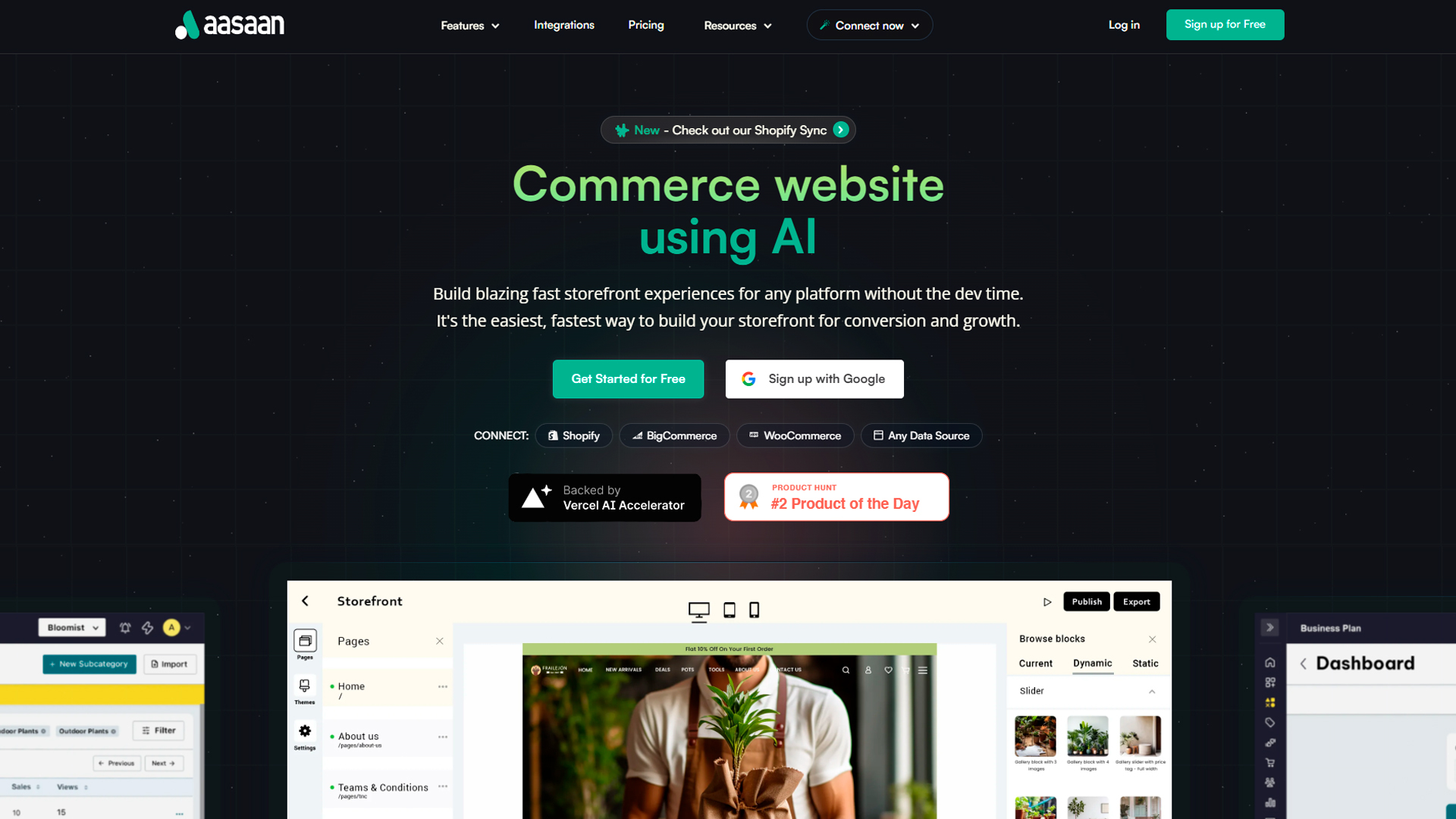
Aasaan is a no-code SaaS platform designed to help SMEs build storefronts and mobile apps quickly and efficiently.
It leverages a headless store builder and an API-first commerce platform to visually create next-generation shopping experiences without the need for coding.
Aasaan is trusted by over 100 partners and is designed to boost site speed, conversion rates, average order value, and time to market.
Notable Features:
Aasaan offers a range of features including seamless integration with existing backends, a drag-and-drop builder for creating bespoke shopping experiences, and a serverless deployment architecture for deploying reliable storefronts.
we also provides a single admin app for managing all aspects of the business, including orders, fulfillments, customers, inventory, and payments.
Additionally, Aasaan offers seamless integrations with other tools to enhance the shopping experience and boost business growth.
Pros and Cons:
Pros:
- No-code platform: Allows SMEs to build storefronts and mobile apps without coding knowledge.
- Speed: Aasaan promises a 70% increase in site speed.
- Conversion rates: Aasaan users have reported a 38% uplift in conversion rates.
Cons:
- Free plan include branding
- Don’t have feature of B2b
Pricing:
- Premium plan: It costs $50 per month if billed annually or $65 per month if billed monthly.
- Business plan: It costs $165 per month if billed annually or $200 per month if billed monthly.
- Enterprise plan: Unlimited scalability, greater control, and dedicated resources for D2C brands to scale. It requires you to contact sales for a custom quote.
Suitable for Which Kind of Business:
Aasaan is suitable for small to medium-sized enterprises (SMEs) looking to build storefronts and mobile apps quickly and efficiently.
It’s particularly beneficial for businesses that want to leverage a headless store builder and an API-first commerce platform.
Customer Service Review:
Aasaan offers a range of services and resources to support their customers, including a help center, community, knowledge base, videos, and technical support.
However, for a more unbiased review, it’s recommended to check out customer reviews on platforms like G2.
2. Shopify plus
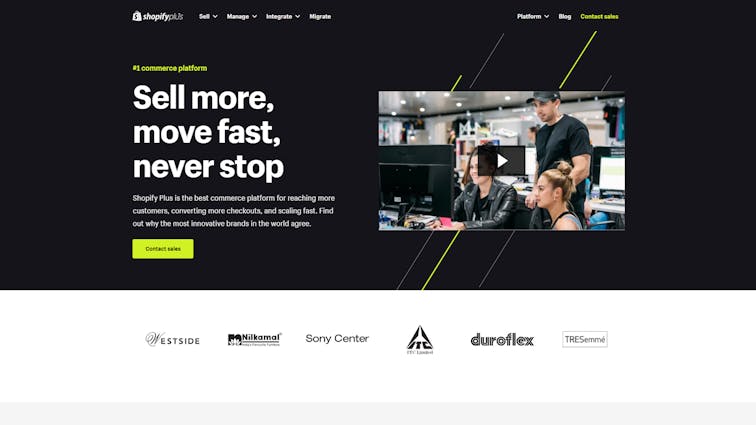
Shopify Plus is an all-in-one commerce platform designed for high-growth, high-volume businesses.
It allows businesses to sell anywhere from one platform, be it direct-to-consumer, retail, B2B, or social media.
This dynamic platform offers centralized data and powerful customer insights across every part of your business.
It’s designed for conversion, scalability, speed, and performance, making it a popular choice among the world’s biggest brands.
Notable Features:
Shopify Plus offers a range of features designed to optimize the eCommerce experience. These include a high-converting checkout system, Shop Pay, that offers a faster checkout experience.
It also provides the ability to automate repetitive and high-performing workflows across systems and stores.
Additionally, it offers a customizable, easy-to-use platform that allows businesses to ship new campaigns, channels, customizations, and experiments quickly.
Pros and Cons:
Pros:
- Flexibility: Sell across every channel and market from one dynamic platform.
- High Conversion: Shopify Plus is designed for conversion, with features like Shop Pay that offer a faster checkout experience.
- Scalability: Shopify Plus is built for businesses to grow, offering unlimited bandwidth and transactions.
Cons:
- Pricing: Shopify Plus can be expensive for small businesses.
- Complexity: The platform’s wide range of features and capabilities may be overwhelming for some users.
Pricing:
It’s recommended to contact their sales team for a personalized quote as per your business needs.
Suitable for Which Kind of Business:
Shopify Plus is suitable for high-growth, high-volume businesses that operate across multiple channels and markets. This includes direct-to-consumer, retail, B2B, and social media businesses.
Customer Service Review:
Shopify Plus offers 24/7 priority technical support by phone, email, or live chat. They also provide a merchant success program that offers platform knowledge and industry insights.
Customers have praised the platform for its personalized migration, launch, and account management support. However, for a more unbiased review, it’s recommended to check out customer reviews on platforms like G2.
3. Bigcommerce
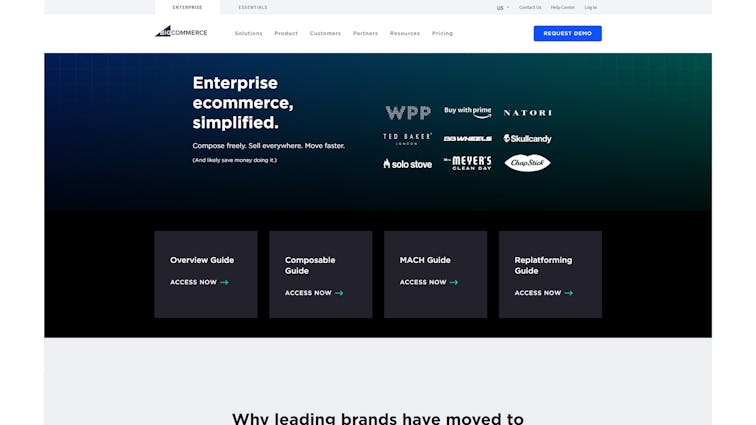
BigCommerce is a trusted commerce solution provider that offers a modern SaaS platform for businesses.
It’s designed to fit your business, providing enterprise integrations and tools you need to customize faster.
BigCommerce is acclaimed for its flexibility, scalability, speed, and essential back-office integrations.
Notable Features:
BigCommerce offers a range of features including native B2C and B2B functionality, omnichannel and Commerce-as-a-Service, open APIs, SDKs and data, composable architecture and headless commerce integrations, frictionless checkout options, and robust security. It also provides actionable insights for data-driven decision-making.
Pros and Cons:
Pros:
- Flexibility: BigCommerce offers an open platform that allows businesses to optimize their ecommerce approach.
- Scalability: It’s designed to handle increased transaction volume and velocity.
- Security: BigCommerce is ISO/IEC 27001:2013 and PCI DSS 3.2, Level 1 certified.
Cons:
- Complexity: The wide range of features and capabilities may be overwhelming for some users.
- Pricing: BigCommerce can be expensive for small businesses.
Pricing:
It’s recommended to contact their team for a personalized quote or visit website.
Suitable for Which Kind of Business:
BigCommerce is suitable for businesses of all sizes, from small businesses to enterprises. It’s particularly beneficial for businesses that want to leverage a flexible, scalable, and secure ecommerce platform.
Customer Service Review:
BigCommerce is known for its high customer satisfaction. They offer a range of services and resources to support their customers, including a help center, community, knowledge base, videos, and technical support.
However, for a more unbiased review, it’s recommended to check out customer reviews on G2 or other platforms.
4. Adobe Commerce (formerly Magento) Overview
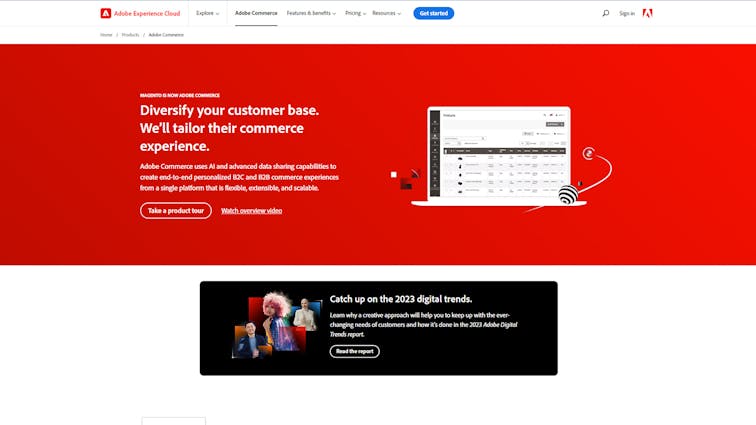
Adobe Commerce, formerly known as Magento, is a leading eCommerce platform designed for businesses of all sizes.
It provides a flexible, scalable solution that allows businesses to create unique, engaging shopping experiences. Adobe Commerce is known for its robust set of features, extensive customization options, and strong community of developers.
Notable Features:
Adobe Commerce offers a wide range of features including customizable shopping experiences, integrated B2B functionality, advanced marketing tools, and seamless third-party integrations. It also provides powerful analytics and reporting tools to help businesses make data-driven decisions.
Pros and Cons:
Pros:
- Flexibility: Adobe Commerce offers extensive customization options.
- Scalability: It can handle high traffic volumes and large product catalogs.
- Strong Community: Adobe Commerce has a large community of developers and users.
Cons:
- Complexity: It can be complex to set up and requires technical expertise.
- Cost: The cost can be high, especially when considering development and maintenance costs.
Pricing:
Adobe Commerce’s pricing is not publicly listed and varies based on the size and needs of the business. It’s recommended to contact Adobe for a personalized quote.
Suitable for Which Kind of Business:
Adobe Commerce is suitable for businesses of all sizes that need a flexible, customizable eCommerce solution. It’s particularly beneficial for businesses with large product catalogs and high traffic volumes.
Customer Service Review:
Adobe offers comprehensive support for Adobe Commerce users, including a dedicated support team, extensive documentation, and a community forum.
However, for a more unbiased review, it’s recommended to check out customer reviews on platforms like G2.
5. OroCommerce Overview
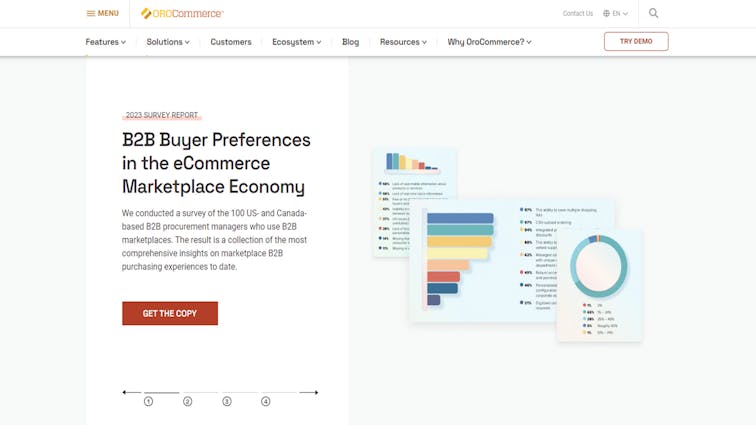
OroCommerce is an enterprise-grade B2B eCommerce platform designed for distributors, wholesalers, brands, and manufacturers.
It offers a comprehensive set of features ready for any B2B commerce model, allowing businesses to create and customize a self-service eCommerce website, customer portal, or wholesale portal.
Notable Features:
OroCommerce offers a range of features including managing corporate accounts, displaying unique price books, showcasing buyer-specific catalogs, supporting Configure-Price-Quote (CPQ) processes, creating custom workflows, and many more B2B capabilities.
Pros and Cons:
Pros:
- B2B Focus: OroCommerce is designed specifically for B2B eCommerce, offering out-of-the-box B2B features.
- Flexibility: It offers a customizable platform that can support any business-to-business eCommerce model.
- Open Source: OroCommerce is an open-source platform, offering complete code transparency and a vibrant community of developers.
Cons:
- Complexity: The wide range of features and capabilities may be overwhelming for some users.
- Pricing: Pricing details are not publicly available on the website.
Pricing:
OroCommerce’s pricing details are not publicly listed on their website. It’s recommended to contact their team for a personalized quote.
Suitable for Which Kind of Business:
OroCommerce is suitable for mid-market and enterprise B2B companies, particularly distributors, wholesalers, brands, and manufacturers.
Customer Service Review:
OroCommerce offers a range of services and resources to support their customers, including a help center, community, knowledge base, videos, and technical support.
However, for a more unbiased review, it’s recommended to check out customer reviews on platforms like G2.
Conclusion
In conclusion, there are several eCommerce platforms available to businesses with varying needs and budgets.
Each of these platforms offers its own benefits and potential drawbacks. When selecting the ideal platform for your business, consider factors such as flexibility, scalability, specific features, pricing, and customer support.
It’s also important to keep your target audience and business goals in mind to ensure that the chosen platform successfully meets your unique requirements and supports future growth.
Take the time to research and compare your options, consult customer reviews, and, if necessary, request personalized quotes to make an informed decision tailored to your business’s needs.
FAQ’S On Best Headless commerce platfroms:
1. What is headless commerce vs PWA?
Headless commerce refers to a decoupled architecture where the front-end and back-end of an e-commerce platform are separated, allowing for greater flexibility and customization. Progressive Web Applications (PWAs) are web applications that provide an app-like experience through modern web technologies. While headless commerce focuses on the architecture, PWAs focus on the user experience.
2. Why is headless commerce faster?
Headless commerce enables faster performance because it eliminates the need to load unnecessary code or features. By separating the front-end from the back-end, developers can optimize each independently, resulting in quicker load times and improved user experience. Additionally, headless commerce allows for the use of modern technologies and content delivery networks (CDNs), further enhancing speed and performance.
3. Why is AI the future of e-commerce?
AI is the future of e-commerce due to its ability to enhance personalization, streamline operations, and improve customer experiences. With AI-powered recommendation systems, chatbots, and predictive analytics, businesses can deliver tailored product suggestions, automate customer interactions, and optimize inventory management. AI’s potential to analyze vast amounts of data enables businesses to make data-driven decisions, target customers effectively, and stay ahead in a competitive market.



